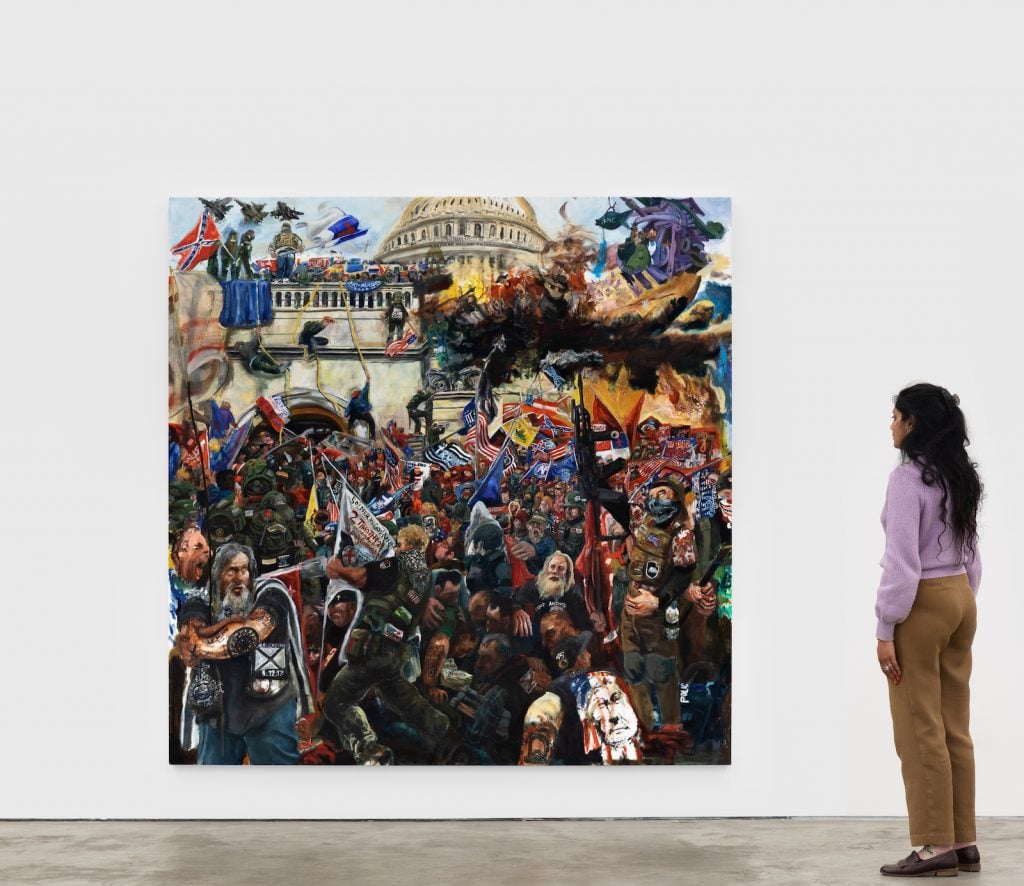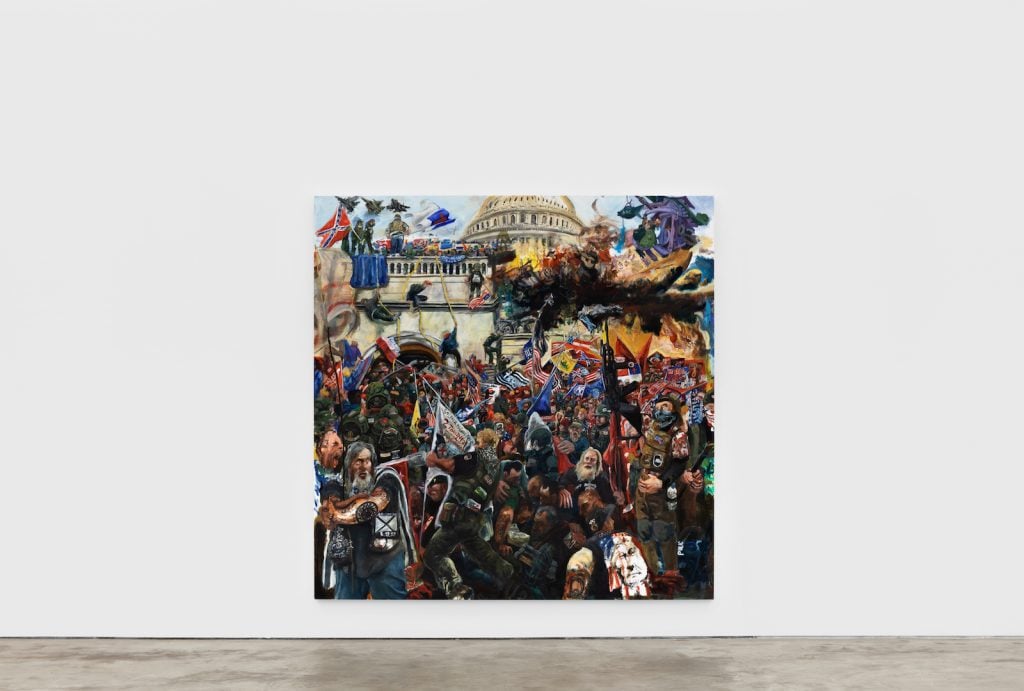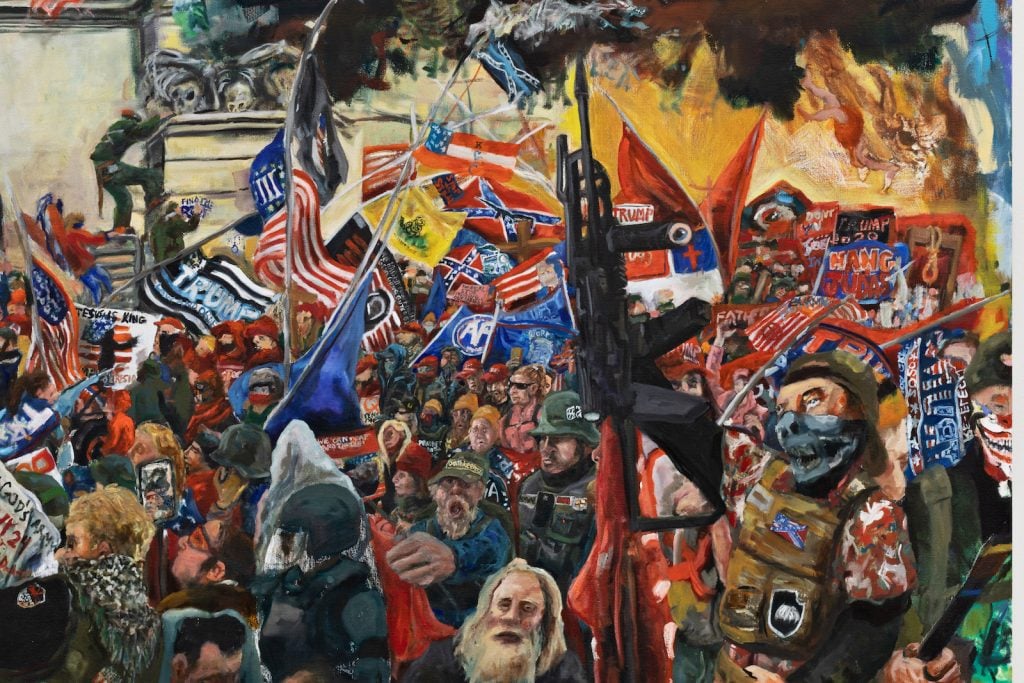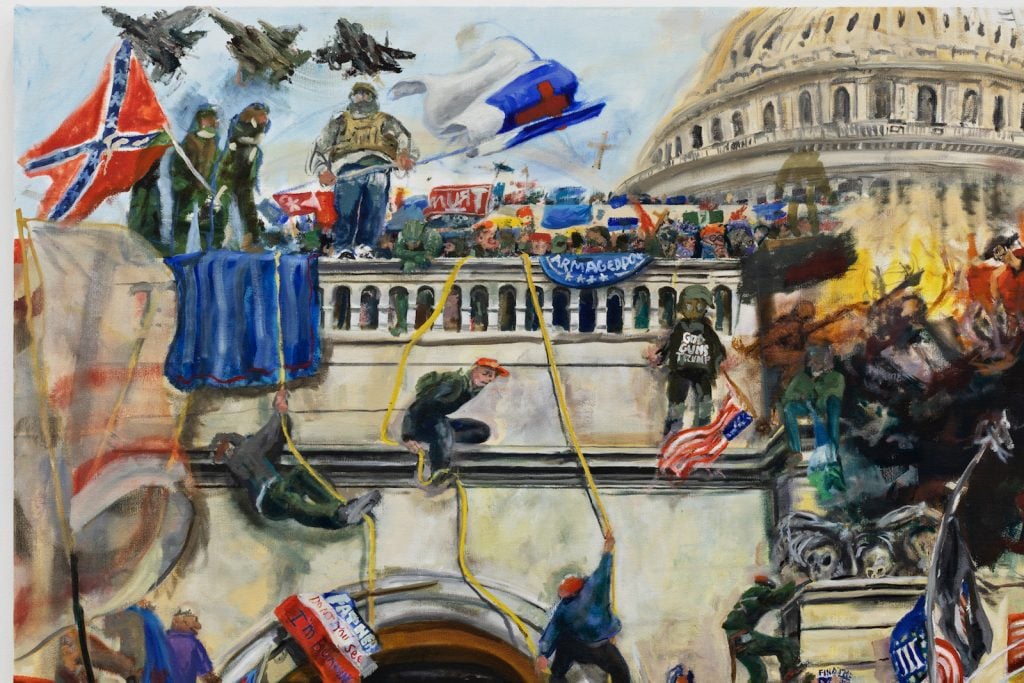On View
‘There Are Monsters on All Sides’: Celeste Dupuy-Spencer on Why Her Epic Painting of the Capitol Riot Is Not a Simple Morality Tale
If you're on the Left, you're not meant to feel smug.

If you're on the Left, you're not meant to feel smug.

Brian Boucher

If you’re hoping to move on quickly from the memory of the deadly January 6 riot at the U.S. Capitol building, Nino Mier’s Los Angeles gallery is not the place for you.
If you want to bask in the rightness of your opposition to the right wing, also not so much.
At the gallery, you’ll be confronted with Don’t You See That I Am Burning (2020), a seven-foot-square painting by Celeste Dupuy-Spencer depicting the deadly insurrection, when thousands stormed Washington in an attempt to overturn the election of Joe Biden.
The picture shows right-wing militias and gangs like the Oath Keepers and the Proud Boys, adherents to the QAnon conspiracy fantasy, Evangelicals, and everyday Americans streaming toward the white building.
Numerous flags fly over the proceedings, bearing slogans like “Soldiers in God’s Army,” “Jesus is King,” and “Trump’s Law and Order.”

Celeste Dupuy-Spencer, Don’t You See That I Am Burning (2020). Courtesy of Nino Mier Gallery and the artist.
Dupuy-Spencer is adept at taking on the pressing issues of the day. In 2017, she painted a toppled Confederate monument in Durham, North Carolina; that same year, she depicted a speeding cop car mounted by demonic figures, summoning police violence. (Officers shot and killed nearly 1,000 people that year, according to the Washington Post.)
Descended from one of the founding families of the city of New Orleans, she has been thinking about how to address her own whiteness in a nation founded in white supremacy, and where dismantling systemic racism remains a profound challenge.
Though set up for greatness—she studied at New York’s Bard College with the likes of Amy Sillman and MacArthur “genius” grantee Nicole Eisenman—she nearly left art behind after a bout with heroin addiction. But ever since Mier’s first solo show of her work in 2016 (which sold out) she’s been on a remarkable trajectory.
The next year, she appeared in the Whitney Biennial (the New Yorker called her a “standout”); a solo that year at New York’s Marlborough Contemporary garnered coverage from Forbes to Vice to Art in America. She was included in the Hammer Museum’s “Made in L.A.” show in 2018; the museum’s curator Anne Ellegood told Elle she would become “one of the great painters of her generation.”
The Capitol riot, founded in white grievance and draped in Confederate flags, drew her in immediately. A painting as ambitious as this might normally take a year to complete, but this one was already on view less than eight weeks after the event.

Celeste Dupuy-Spencer, Don’t You See That I Am Burning (2020, detail). Courtesy of Nino Mier Gallery and the artist.
The artwork’s title refers to a passage in Sigmund Freud’s Interpretation of Dreams. A young boy has died and is laid out in his bed, surrounded by candles. His father, asleep in the next room, dreams that his son comes to him, saying, “Father, don’t you see I’m burning?” He awakens to find one of the candles has fallen onto his son’s arm.
“I was thinking of the dream as a critique of the American Dream,” Dupuy-Spencer said in a phone interview. In Freud’s dream theory, she said, “disturbances that happen outside the sleeper are incorporated into the dream. In case of emergency, those are pulled in, and the dream wakes the dreamer up. This idea of the American Dream is a hallucination we’re all having together, including, or especially, the Left. The rioters are one of the things that our dreaming psyche adds into the dream to try to wake us up.”
When Trump’s immigration policies shut out migrants and refugees, Leftists readily cited Emma Lazarus’s poem The New Colossus, with its famous line “give me your tired, your poor, / your huddled masses yearning to breathe free.”
But “that was propaganda, created at a time when the U.S. was persecuting and deporting record numbers of people from war-torn countries,” says the artist.

Celeste Dupuy-Spencer, Don’t You See That I Am Burning (2020, detail). Courtesy of Nino Mier Gallery and the artist.
If you fall for the propaganda, she says, you are just likely to believe that “we don’t have to fight for justice if that’s what the country does by itself.”
To stay in the dream, the fantasy, it’s necessary to believe you’re on the side of good against evil, she says, and she’s aware that this painting could easily be seen by progressives as just an indictment of the right. But look closer. The painting also shows bomber jets, referring to Biden’s bombing of facilities in Syria that were supposedly in use by Iran-backed militias.
“I was conscious of the fact that most of the people looking at this painting are going to look at it as the spectacle of the monstrous right wing defacing our god-given Capitol, and this was a direct assault on the impulse to look at it like that,” she said.
Biden’s participation in ongoing war in the Middle East, with inevitable civilian casualties, doesn’t allow us such an easy out.
“There are monsters,” she says, “on all sides.”
“The Dream of the ‘Burning Child‘” is on view at Nino Mier Los Angeles through March 24.